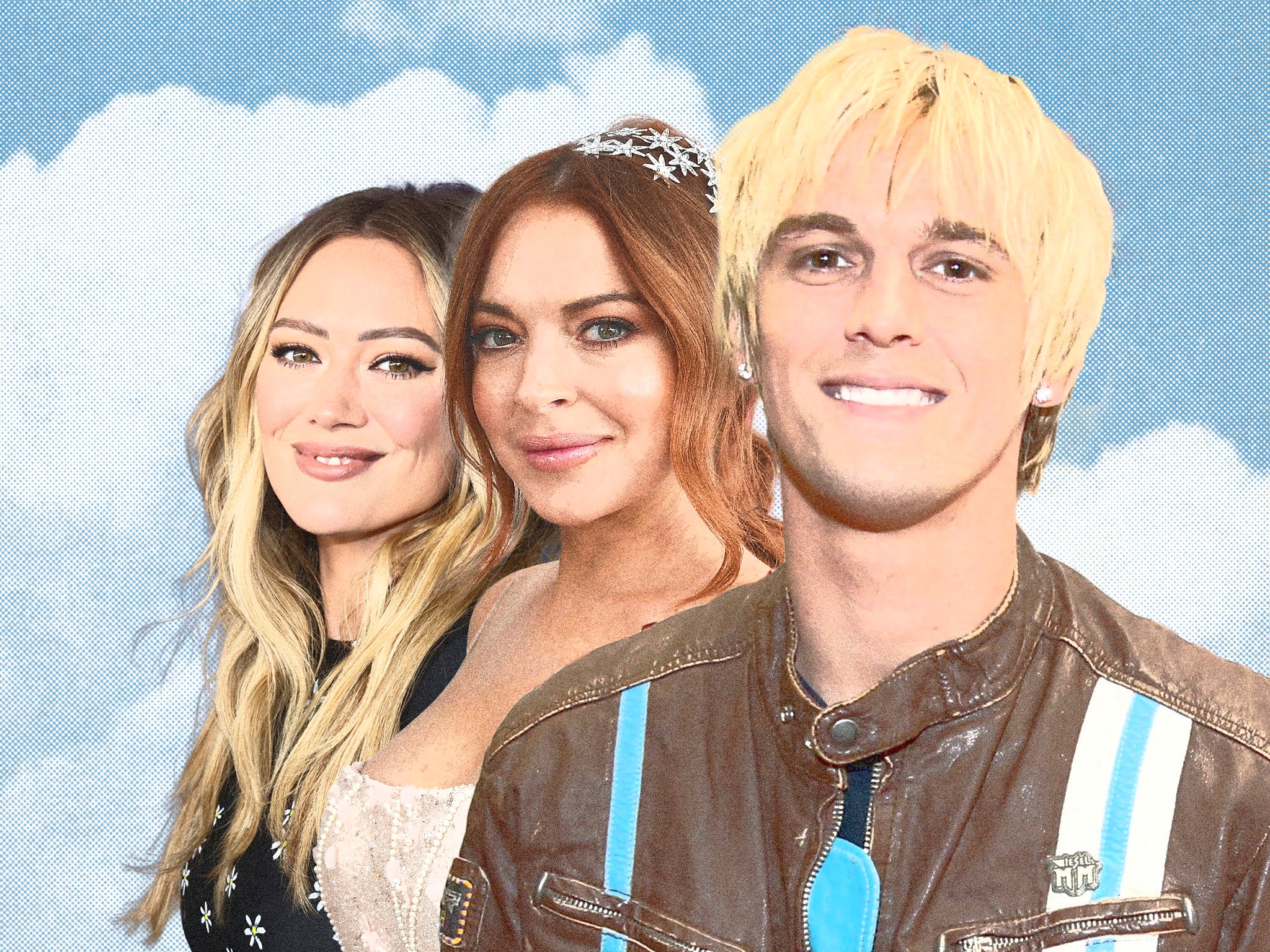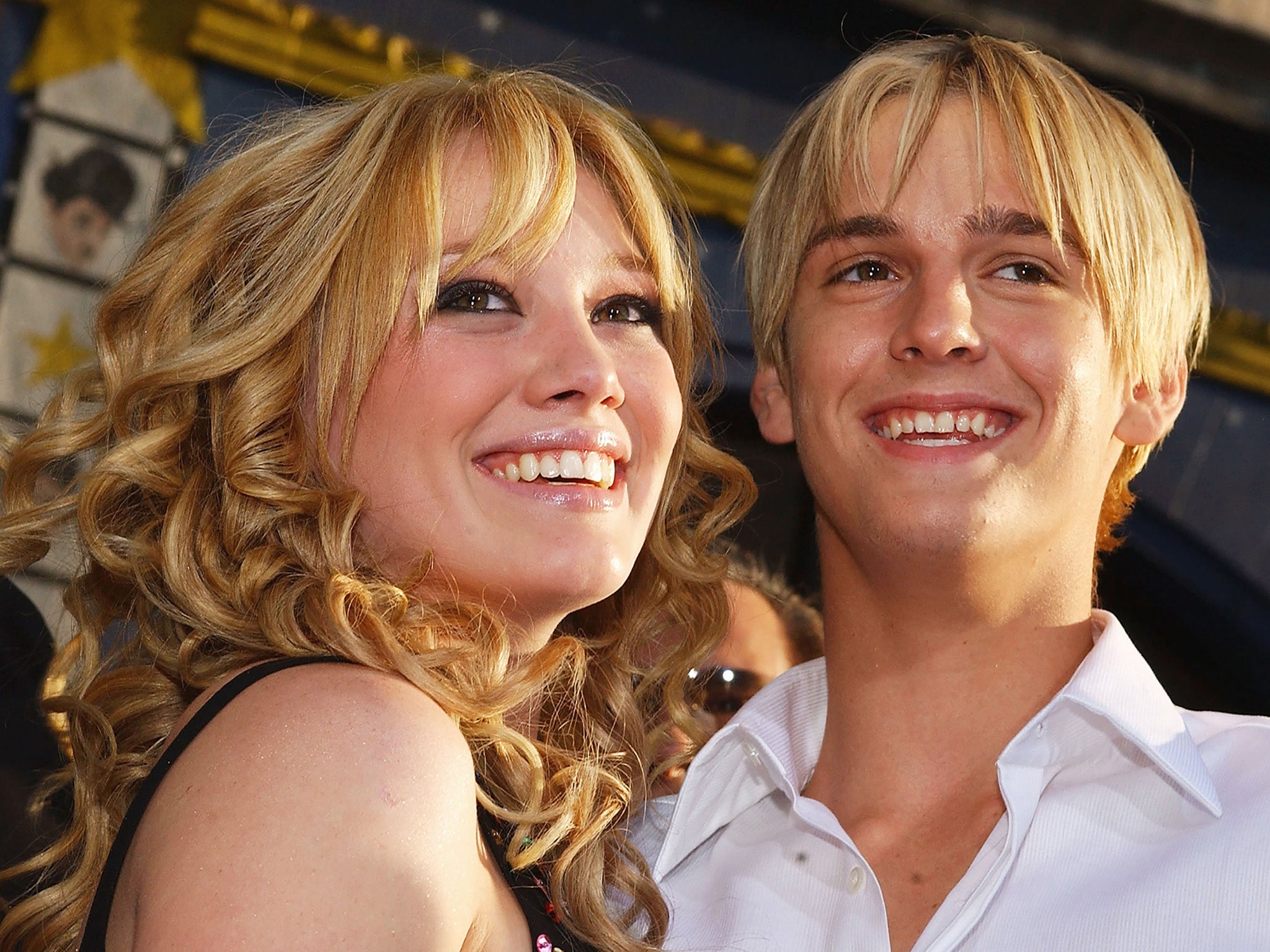‘No comment on Aaron, Lindsay?’: How social media permanently changed the way we grieve
When Nineties pop star Aaron Carter died last weekend, many turned to his famous exes Hilary Duff and Lindsay Lohan for words of wisdom – and demanded them when they weren’t immediately forthcoming. Eloise Hendy asks whether social media has permanently altered the way we grieve


If there’s one thing tabloids, gossip columns and internet rumour mills delight in more than a celebrity love triangle, it’s a love triangle that ends in tragedy. Add a dose of Noughties nostalgia into the mix and you’ve got a recipe for the perfect media storm. So it probably shouldn’t have come as a surprise that the as-yet-unexplained death of late Nineties pop star Aaron Carter opened the floodgates to a tsunami of headlines, many of which dragged two other Y2K icons into the tumult. He was the quintessential, proto-Bieber, troubled teen heartthrob. Famous at the age of nine. A multi-platinum artist before hitting puberty. And, in his adulthood, the living embodiment of the many ways both those facts might derail a person’s ability to have any semblance of a normal life. Yet to many millennials he will most likely always be known as one-third of the ultimate teeny-bopper love triangle. For a relatively brief period between 2002 and 2003, Carter was simultaneously on-off dating Lizzie McGuire-era Hilary Duff and a pre-Mean Girls Lindsay Lohan.
I bet I know what you’re thinking. “I wish I knew exactly how both women are grieving for their teenage boyfriend,” right? Well if that is the case then you’re in luck, because both Duff and Lohan have, in the words of headlines everywhere, “given their reactions”, “paid tribute” and since “spoken out” on Carter’s death. “For Aaron,” Duff wrote in an Instagram post on Sunday, “I’m sorry that life was so hard for you and that you had to struggle in front of the whole world. You had a charm that was effervescent… boy did my teenage self love you deeply”. She signed off the post by “sending love to [Carter’s] family at this time. Rest easy.” The following day, Lohan said something similar in a pair of interviews. Speaking with Access Hollywood, Lohan recalled how she shared many memories with Carter when she was “so young,” while clarifying that it had been a “long time” since they had spoken. “My heart goes out to his family and may he rest in peace,” Lohan said in another conversation with Entertainment Tonight. “God bless him,” she continued, professing there was “just a lot of love there”.
The responses to these sweet gestures to the family and memory of a man who both women were attached to before either of them turned 16? Supportive and totally normal? Well, not quite. Roughly 24 hours separated the two women’s statements, but for celebrity obsessed social media users that’s basically a lifetime. While commenters were quick to praise Duff’s post – with one even writing, “I was looking forward to your comment & u did not disappoint” – Lohan was equally quickly criticised for continuing to post non-Aaron Carter content as usual. Under a post about enjoying her stay at a New York hotel, the comments began to pile up. “No comment on Aaron?” “Aaron Carter was your friend?” Many directly referenced Duff’s post, possibly in the hope of reigniting a 20-year-old “feud” between the pair. “Hilary has way more class, at least she posted something,” wrote one, while another suggested that as “Hilary left a comment for Aaron but Lindsay haven’t [sic]”, it seemed that “Lindsay has already moved on and doesn’t care”. No matter that Lohan is in the middle of a press tour for one of her first feature films in a decade. Or, indeed, that she was only hours away from speaking about her “love” for Carter. If her emotions weren’t rapidly displayed via the medium of a grid post then, sorry, they might as well not exist. The message was clear: when it comes to grieving, Hilary was doing it right, and Lindsay was doing it wrong.
So, here’s the big question: have the last few decades of near-permanent celebrity gossip poisoned our brains? Are we so used to the raking over of stars’ intimate lives that we feel entitled to their grief, too? And as publicly and preferably as soon after tragedy strikes as possible?
Dipti Solanki is a grief coach and educator. She believes the expectation for celebrities to “react” to tragic news stories stems from a wider cultural discomfort with death. “Overall, it’s fair to say that a large part of society is illiterate when it comes to processing grief,” Solanki says. “It feels alien, isolating and still very much taboo.” In contemporary Western culture in particular, Solanki suggests people have been “conditioned and taught how to celebrate the good events in life”. When it comes to loss, though, “many people feel quite at sea”. As celebrity culture and social media informs and influences more of our choices, opinions and actions, “it’s no surprise that many look to celebrities for their reactions,” Solanki suggests. “[And then] use those as a yardstick to gauge and navigate their own feelings. It’s almost as if they act as a barometer.”
Grief recovery specialist Iman Gatti seems to agree. “No matter how universal grief is,” she says, “most people find it extremely uncomfortable.” In her line of work, Gatti says she is “constantly meeting grievers who worry that they are doing it wrong or overreacting.” This is why she too says she’s “never surprised at how invested people are in the reactions of celebrities when someone passes”. Because, as she puts it, “we want more evidence that they will reflect our own feelings back to us,” and therefore validate them. But what about when this investment in celebrities’ feelings tips over into a policing of how and when they do react, as in the case of Lohan?
It is undeniable that the advent of social media has changed our relationships with celebrities and their private lives. The press – which largely relied on interviews and paparazzi images to get scoops at the peak of the Carter/Duff/Lohan triangle – now often plays catch up to celebrities’ social media channels. Stars can break their own stories and share aspects of their lives with an immediacy that was unimaginable a decade ago. Yet it increasingly seems like this immediacy is creating a vicious cycle of assumption and entitlement. The expectation that public figures share their everyday lives becomes, as Solanki puts it, “a demand on those in the public eye to share openly and immediately about how they feel”.
We live in an age where we are largely removed from death and dying
On one hand, then, people may look to celebrities to validate their own confused feelings, and assuage concerns they may be “doing grieving wrong”. On the other hand, an over-investment in those very same celebrities may in fact enforce damaging beliefs about how grief “should” make someone behave.
Emily Cummin is the founder and CEO of Untangle, a grief community platform that provides emotional and practical help to people going through bereavement. She spells it out: “Grief is incredibly personal and everyone grieves differently.” Just like Gatti, she says she has heard “countless stories” from members of the Untangle community “about being told ‘they don’t seem sad’, or ‘they seem happy now, so they must be over their grief’.” It is this kind of simplistic but pervasive misunderstanding about grieving that was clearly on display this week. Because Lohan didn’t comment immediately, many cynically assumed she’d “already moved on and doesn’t care”. This kind of “demand for celebrities to behave a certain way after a bereavement is unhealthy,” Cummin asserts, because “it adds to the expectation that there’s a right or wrong way to grieve.”

Ultimately, the current cultural obsession with the performance of grief circles back to our discomfort with its knotty realities. Ali Ross, spokesperson for the UK Council for Psychotherapy, indicates that grief remains taboo, because “we live in an age where we are largely removed from death and dying”. In his view, the pandemic made this worse as, despite death and grief touching a great many, “we lost the permission and ability to publicly mourn in person during lockdown”. Perhaps, then, the over-investment in celebrities’ public statements may not say much about our attitudes to the rich and famous at all, but speak much more directly to a deeper desire to have death, grief and mourning more openly discussed and acknowledged.
“In terms of Aaron Carter,” Ross says, “he is a public figure who some people followed, who transports them back to a nostalgic time, reminds them of the passing of time, their ageing, mortality, but also, in his particular case, embodies the potential tragedy of being in the public eye.” As he says, “this is a lot to process.”
Yet it would be another tragedy if, in attempting to process tangled feelings about Carter’s death, people inflicted pressure and harm on other figures in the public eye. Specifically people like Lohan, who, as Duff wrote of Carter, has also had to “struggle in front of the world”. Surely anyone who has followed the highly publicised ups and downs of both of them would know this. Now, following Carter’s untimely death, it would be nice to think we might learn something.
Join our commenting forum
Join thought-provoking conversations, follow other Independent readers and see their replies
Comments


Bookmark popover
Removed from bookmarks